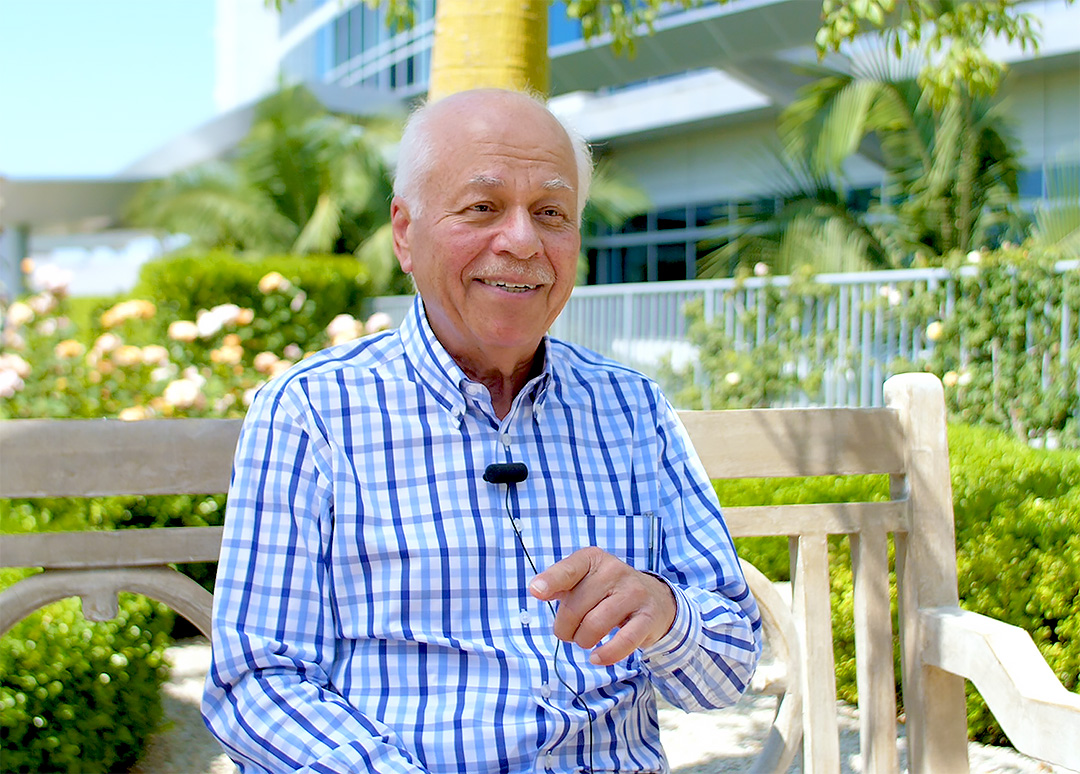
In January, Harris Found Out He Had Pancreatic Cancer, and in September, His Treatments End.
Harris Bass is quite the magnificent man. At 71, Harris was diagnosed with early stage 2 pancreatic cancer as a direct result of his participation in the Galleri blood test clinical study. As a result of the early detection of his cancer, Harris is now a strong advocate for the Galleri test so others can find cancer early as well, where it may be treated. He has continued to stay positive throughout. Fortunate to have found pancreatic cancer early, his curiosity for the science behind the test has driven him to raise awareness.
“Luckily…the Galleri test, my understanding is it comes back at a 99.5 percent chance that you have cancer, if it registers positive.”
– Harris Bass
The Galleri test, or MCED (Multi-Cancer Early Detection) test, is part of a multi-national, two-year clinical trial. Its significance is that it can detect up to 50 cancers from a single blood draw. Dr. Ora Gordon, Professor of Genetics at Saint John’s Cancer Institute, is one of the principal investigators for the MCED trial (seen in the video below). She met with Mr. Bass on the day of his testimonial to discuss his results further and what lies ahead for him. If you are interested in MCED testing, click here.
“The best way to cure cancer is to find it early.”
– Ora Gordon, MD
If there is a cancer diagnosis, which may involve additional tests, participants in the MCED clinical trial are ushered through treatment rather quickly at Saint John’s.
Mr. Bass went from diagnosis to starting treatment in 8 days, which took Harris by surprise, given other healthcare experiences. Dr. Anton Bilchik, surgical oncologist, urgently pressed for the first available surgery date after diagnosis. “I was told he was the top surgeon for pancreatic cancer,” Mr. Bass remarks after being referred to Dr. Bilchik by his primary physician at Cedars Sinai. Since pancreatic cancer is usually found in late-stage, or incidentally (such as on MRI or CT scan), and is an aggressive cancer, the survival rate is very low, which is why his surgery was fast-tracked. “It is crucial that your primary doctors are good, and that they can move you along through the system,” Mr. Bass emphasizes in his testimonial below. Dr. Bilchik is the Chief of General Surgery at Saint John’s Health Center in Santa Monica, California, and Professor of Surgery for gastrointestinal and hepatobiliary diseases at Saint John’s Cancer Institute.
Harris is currently undergoing chemotherapy treatments because the cancer entered into one of ten lymph nodes.
In one month, Mr. Bass is expected to conclude treatments for pancreatic cancer.
“I would tell anybody to come here.”
– Harris Bass
Listen to Mr. Bass’s Incredible Journey with Pancreatic Cancer
Harris Bass discusses MCED, and walks with Dr. Ora Gordon at Saint John’s Health Center in Saint Monica, California.
When asked if there was any advice he’d give to someone who had cancer, Harris responded, “find doctors who will advocate for you.”
Pancreatic Cancer FAQs:
Learning about pancreatic cancer will probably leave many angry, afraid, and maybe a combination of. Pancreatic cancer is deadly often due to:
- A lack of screening methods until now
- Late-stage diagnosis
- Rapid spread to other organs in the body
- Limited treatment options as compared to other types of cancer
Because the pancreas is deep inside the body, early tumors can’t be seen or felt by a health care provider during routine physical exams. People typically have no symptoms until the cancer has become large or has metastasized to other organs. When symptoms do present, the signs and symptoms appear as other illnesses.
Signs and symptoms of pancreatic cancer
- Fatigue or abnormal physical weakness
- Jaundice, dark urine, itchy skin
- Weight loss or poor appetite
- Nausea and vomiting
- Gallbladder or liver enlargement
- Blood clots
- Diabetes
If a family member was diagnosed with pancreatic cancer, it’s important to know you are at an increased risk of developing pancreatic cancer yourself.
Pancreatic cancer is an aggressive cancer, and nearly 50 percent of the time it is diagnosed in a late stage, and too late. The 5-year survival rate is 5 percent. Someone can go from stage 1 to stage 4 in just under a year.
Staging for pancreatic cancer, or any cancer, depends on tumor size, and how far outside the primary site it has spread (lymph nodes, or to other organs).
Stage 2 pancreatic cancer indicates the cancer has spread to 3 or less lymph nodes and the tumor is between 2 cm and 4 cm across.
Pancreatic cancer is controllable if found before it spreads and when it can be completely removed by surgery.
The Galleri Test is the only screening method we have to diagnose pancreatic cancer early. Please contact us if you have any questions.
Interview Correction:
When there is a positive result for the Galleri test, the chance that the result is truly positive is called positive predictive value (PPV) and is approximately 43%. The statistic of 99.5% describes the Galleri test’s specificity, or the ability of the test to identify people who do not have cancer.
Resources:
- Signs & Symptoms of Pancreatic Cancer
- Staging of Pancreatic Cancer
- Survival Rates for Pancreatic Cancer
- Pancreatic Cancer Treatment



